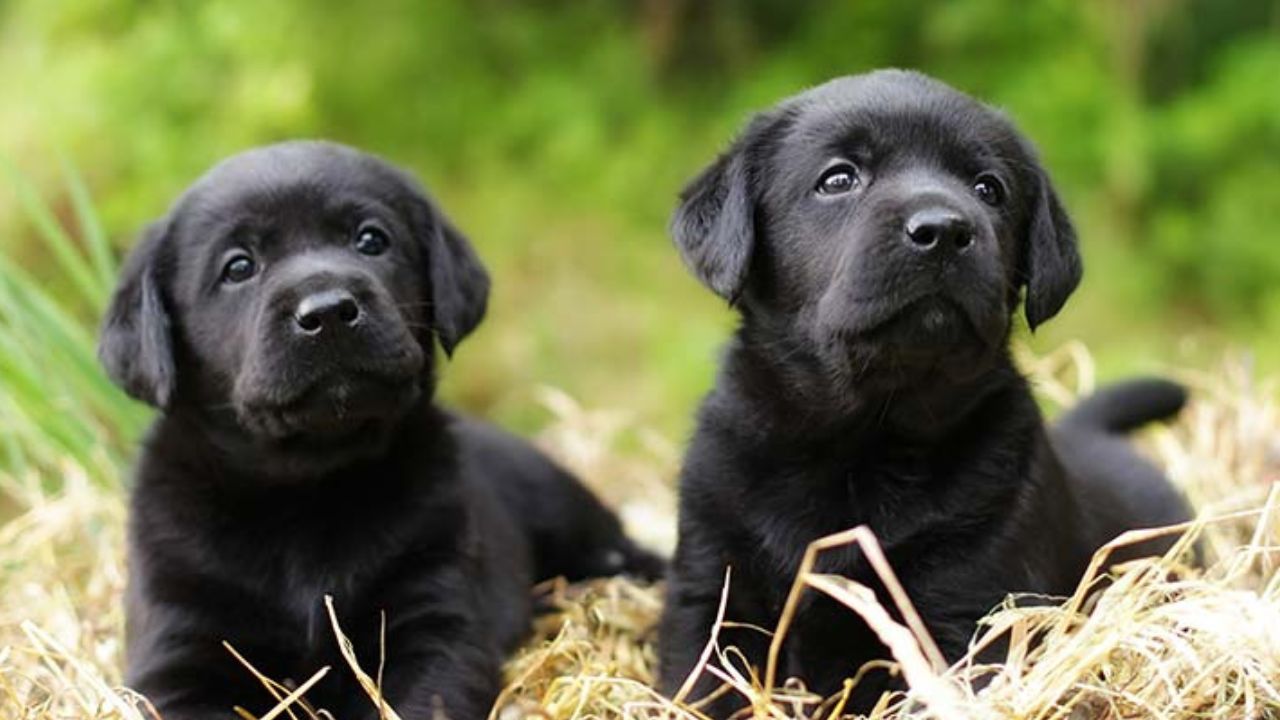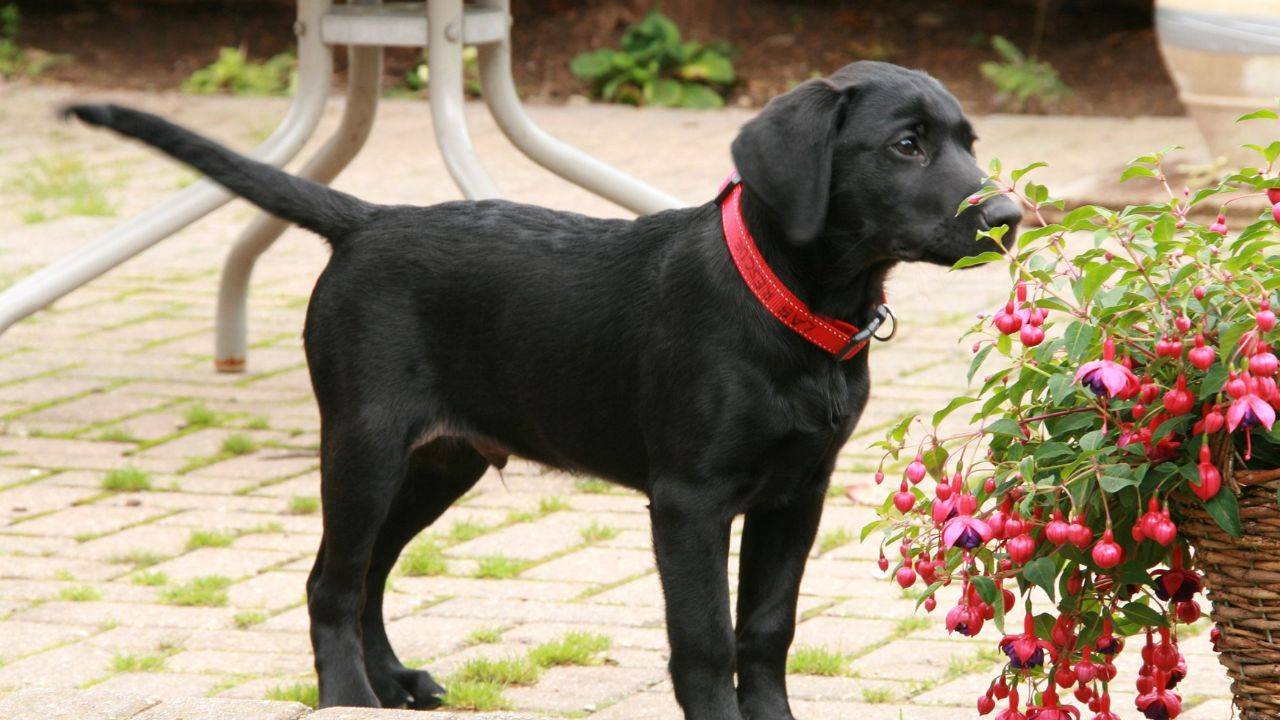Black Lab Puppy: The Ultimate Guide to Caring for Your New Furry Friend
Black Labrador Retrievers are one of the most popular dog breeds in the United States, and for good reason. These loyal and friendly dogs make great family pets, and their intelligence and trainability make them excellent working dogs. If you’re considering adding a black Lab puppy to your family, you should know a few things to ensure you make the right choice for you and your household.

When selecting a black Lab puppy, it’s important to choose a reputable breeder who prioritizes the health and well-being of their dogs. A good breeder will happily answer your questions and provide information about the puppy’s parents, health history, and temperament. You should also be prepared to provide a safe and comfortable home for your new puppy, with plenty of toys, bedding, and nutritious food.
Once you bring your black Lab puppy home, providing them with proper health care and training is important. Regular veterinary check-ups, vaccinations, and a nutritious diet are all essential for keeping your puppy healthy and happy. Additionally, early socialization and training can help your puppy develop good habits and behaviors that will last a lifetime. You can help your black Lab puppy grow into a loyal, well-behaved companion with patience, consistency, and love.
Key Takeaways
- Choosing a reputable breeder is essential when selecting a black Lab puppy.
- Proper health care and training are crucial for keeping your puppy healthy and happy.
- Early socialization and training can help your black Lab puppy develop good habits and behaviors.
Breed Overview

Black Lab puppies are a popular breed of Labrador Retriever. They are known for their friendly nature, high-spirited companionship, and willingness to please their owners. This section will provide an overview of the breed’s history, characteristics, and temperament.
History
The Labrador Retriever breed originated in Newfoundland, Canada, and was initially used as a working dog for fishermen. They were trained to retrieve fish falling off hooks and pull nets from the water. In the early 1800s, the breed was transported into England and bred and polished. Today, Labradors are one of the most popular breeds in the world.
Characteristics
Black Lab puppies are medium-to-large dogs with short, dense, water-resistant coats. They can weigh 55 to 80 pounds and stand 21.5 to 24.5 inches tall at the shoulder. They have a large head, powerful jaws, and a robust physique. Their ears are drop-shaped and close to the skull.
Temperament
Black Lab puppies are known for their friendly and outgoing nature. They are intelligent, loyal, and eager to please their owners. They are also easy to train, making them a great choice for service and therapy roles.
Labs are excellent with children and other pets, and they love playing. They also have a fondness for water and are exceptional swimmers.
Puppy Selection

When selecting a black labrador retriever puppy, it is important to find a reputable breeder who prioritizes the health and well-being of their dogs. Choosing a puppy that is a good fit for your lifestyle and personality is also important. Here are some tips for finding a breeder and choosing the right puppy.
Finding a Breeder
The initial step in locating a breeder involves conducting thorough research. Look for breeders with a good reputation who are members of the AKC (American Kennel Club) or other reputable breed organizations. You can also ask for recommendations from your veterinarian, local dog clubs, or other dog owners.
When you find a breeder you want, ask them to visit their facility and meet their dogs. A reputable breeder will gladly tour you and respond to all your inquiries.
Look for signs of healthy and happy dogs, such as clean and well-maintained facilities, friendly and well-socialized dogs, and health certifications.
Choosing the Right Puppy
When choosing a black labrador retriever puppy, it is important to consider your lifestyle and personality. For example, if you are an active person who enjoys outdoor activities, you may want to choose a more energetic and playful puppy. You may also choose a more social and friendly puppy if you have young children or other pets.
It is also important to consider the puppy’s temperament and health. Look for a puppy that is alert, curious, and playful. Avoid puppies that are passive, shy, or aggressive. Ask the breeder for health certifications and information on the puppy’s parents and lineage.
Overall, choosing a black labrador retriever puppy requires careful research and consideration. Finding a reputable breeder and choosing a puppy that fits your lifestyle and personality can ensure a happy and healthy life for your new furry friend.
Health and Care

Black Labrador puppies are generally healthy and sturdy, but like all breeds, they are prone to certain health issues. Proper care and attention are necessary to ensure the well-being of your furry friend. This section will discuss the dietary needs, exercise requirements, common health issues, grooming, and maintenance of black lab puppies.
Dietary Needs
Black lab puppies require a balanced diet with all the essential nutrients, vitamins, and minerals. A high-quality puppy food that contains protein, fat, and carbohydrates is recommended. Puppies should be fed three to four small meals a day until they are six months old, after which they can be fed twice daily.
It is important to avoid overfeeding your black lab puppy, as they tend to gain weight quickly. Obesity can lead to joint problems and other health issues. Treats should be in moderation and not exceed 10% of their daily caloric intake.
Exercise Requirements
Black lab puppies are energetic and require regular exercise to stay healthy and happy. They require a minimum of 30 minutes of daily exercise, though more is preferable. Exercise can include walks, runs, swimming, and playing fetch. Exercise not only keeps them physically fit but also helps to reduce behavior problems.
Common Health Issues
Black lab puppies are prone to certain health issues, including hip dysplasia, elbow dysplasia, and eye problems such as cataracts and progressive retinal atrophy. Regular visits to the vet are recommended to detect any health issues early on. Vaccinations, deworming, and flea and tick prevention are important for their overall health.
Grooming and Maintenance
Black lab puppies have a short, dense coat that requires minimal grooming. A soft-bristled brush for regular grooming can help eliminate loose hair and maintain a shiny coat. Bathing should be done only when necessary as frequent bathing can strip their coat of its natural oils. Regular ear cleaning, nail trimming, and dental care are also important for their health.
In conclusion, black lab puppies require proper care and attention to ensure their well-being. A balanced diet, exercise, and visits to the vet are necessary for their overall health. Consistent grooming and upkeep will ensure they look and feel their best.
Training and Socialization

Basic Training
Training is an essential part of raising a black lab puppy. Basic training should start as soon as possible to establish good habits and behaviors. The first step is to teach your puppy basic commands like “sit,” “stay,” and “come.” These commands can be taught using positive reinforcement techniques such as treats, praise, and affection. Consistency is key when training a puppy, so practice these commands daily.
Socialization Techniques
Socialization is another crucial aspect of raising a black lab puppy. Socialization involves exposing your puppy to various people, animals, and environments. This helps your puppy become confident and adaptable to different situations. Take your puppy to places such as parks, pet-friendly stores, or training classes where they can interact with other dogs and people. Introduce your puppy to different sounds, smells, and textures to help them become comfortable with new experiences.
Behavioral Problems
Behavioral problems can arise if a puppy is not properly trained and socialized. Some common behavioral problems in black lab puppies include chewing, jumping, and barking excessively. These problems can be addressed through positive reinforcement training techniques. For example, if your puppy is chewing on something, they shouldn’t redirect their attention to an appropriate toy and reward them when they play with it.
In conclusion, training and socialization are essential for raising a well-behaved and happy black lab puppy. Your puppy can learn good habits and behaviors that will last a lifetime with consistent training and positive reinforcement.
Living with a Black Lab Puppy

Black Lab puppies are adorable, energetic, and intelligent. They make great companions and are known for their friendly and playful personalities. However, living with a Black Lab puppy requires adjustments to daily routines, family integration, ageing, and transition.
Daily Routine
Black Lab puppies are high-energy dogs that require plenty of exercise and playtime. Establishing a consistent routine early on helps them develop good habits and prevent behavior problems. A daily routine that includes regular walks, playtime, and training sessions is essential to keeping them happy and healthy.
Family Integration
Black Lab puppies are social animals that thrive on human interaction. They get along well with children and are outstanding pets for families. However, it’s important to supervise interactions between children and puppies to prevent accidents. Black Lab puppies are also prone to separation anxiety, so it’s important to gradually introduce them to alone time and provide plenty of toys and activities to keep them occupied.
Ageing and Transition
Black Lab puppies grow quickly; appropriate care is important as they age. Regular vet check-ups, a healthy diet, and plenty of exercise are essential to keeping them healthy and happy. As they age, they may require adjustments to their routine and diet to accommodate changing needs. It is important to provide them love and attention throughout their lives to ensure a happy and healthy transition into old age.
Living with a Black Lab puppy requires a consistent daily routine that includes exercise, playtime, and training. They are social animals and thrive on human interaction, so it’s important to integrate them into the family and provide plenty of love and attention. As they age, they may require adjustments to their care, but with proper care and attention, they can live happy and healthy lives.
Preparing Your Home for a Black Lab Puppy
Puppy-Proofing Your Living Space
Remove Hazardous Items: Ensure all electrical cords, toxic plants, and small objects are out of reach.
Secure Loose Wires: Bundle and hide electrical wires to prevent chewing hazards.
Block Off Restricted Areas: Use baby gates to keep the puppy in safe zones and out of rooms where they shouldn’t be.
Lock Cabinets and Drawers: Childproof locks can secure cabinets containing cleaning supplies, medications, and other hazardous materials.
Check for Small Gaps: Seal any small spaces where the puppy can get stuck or hide.
Essential Supplies and Equipment
- Bedding: Provide a comfortable bed in a quiet area where your puppy can rest.
- Crate: Choose an appropriately sized crate for crate training and safe transport.
- Food and Water Bowls: Use sturdy, non-tip bowls for food and water.
- Puppy Food: Select high-quality puppy food recommended by your veterinarian.
- Toys: Provide a variety of chew toys, puzzle toys, and fetch toys to keep your puppy entertained.
- Leash and Collar: Get a properly fitted collar and a durable leash for walks and training.
- Puppy Pads: Use training pads to help with housebreaking.
- Grooming Supplies: Include a brush, nail clippers, and pet-safe shampoo.
- Identification Tags: Ensure your puppy has ID tags with your contact information.
- First Aid Kit: Keep a pet-specific kit on hand for emergencies.
Feeding and Nutrition
Choosing the Right Puppy Food
- Consult Your Veterinarian: Before selecting a puppy food, consult your veterinarian for recommendations tailored to your Black Lab’s specific needs.
- Look for Quality Ingredients: Choose a puppy food with high-quality protein sources, such as chicken, lamb, or fish, as the main ingredient.
- Check for Essential Nutrients: Ensure the food contains essential vitamins and minerals, including DHA for brain development and calcium for growing bones.
- Avoid Fillers and By-products: Avoid foods with fillers like corn, soy, and wheat, as well as animal by-products, which offer little nutritional value.
- Consider Special Formulas: If your puppy has specific dietary needs or sensitivities, look for specialized formulas such as grain-free or hypoallergenic options.
Feeding Schedule and Portion Control
- Establish a Routine: To establish a consistent routine, feed your Black Lab puppy at the same times each day.
- Frequency: Puppies under six months old should be fed three to four times daily. After six months, you can reduce feeding to twice a day.
- Portion Sizes: Follow the feeding guidelines on the puppy food packaging, adjusting portions based on your puppy’s growth and activity level. Overfeeding can lead to obesity and health issues.
- Monitor Weight and Health: Regularly monitor your puppy’s weight and body condition. Adjust the amount of food as needed to maintain a healthy weight.
- Fresh Water: Always provide fresh, clean water for your puppy to ensure proper hydration.
Supplements and Treats - Consult with Your Vet: Before giving any supplements, consult your veterinarian to determine if your puppy needs additional nutrients beyond what their food provides.
- Common Supplements: Common supplements for puppies may include omega-3 fatty acids for skin and coat health, glucosamine for joint support, and probiotics for digestive health.
- Healthy Treats: Use healthy, low-calorie treats for training and rewards. Avoid giving too many treats to prevent weight gain.
Conclusion
Caring for a black lab puppy involves a blend of attentive healthcare, proper nutrition, consistent training, and abundant love. Ensuring your puppy has regular veterinary visits, receives all necessary vaccinations, and undergoes routine health checks is fundamental to their well-being. Feeding them a balanced diet suited to their developmental stage supports physical health and energy levels. Training and socialization are crucial for developing good behavior and adaptability, enhancing the bond between you and your pet. By dedicating time and attention to these aspects, you can foster a nurturing environment that allows your black lab puppy to grow into a joyful and healthy companion.
Frequently Asked Questions
How much does a Black Lab puppy typically cost?
The cost of a Black Lab puppy varies widely depending on several factors, such as the breeder’s reputation, geographical location, and the puppy’s pedigree. However, on average, a Black Lab puppy can cost between $800 and $1200. It is essential to note that the price should not be the only factor to consider when selecting a puppy.
What should I look for when selecting a Black Lab puppy for sale?
Several factors must be considered when selecting a Black Lab puppy for sale. First, check the puppy’s health for signs of illness or physical deformities. Second, look for a puppy with a good temperament that is friendly, energetic, and playful. Third, consider the puppy’s parents’ health and temperament since it can give you an idea of what to expect from the puppy.
Where can I find reputable Black Lab puppy breeders near me?
Finding reputable Black Lab puppy breeders near you can be challenging, but several resources are available. You can start by contacting local breed clubs or the American Kennel Club (AKC) for referrals. Additionally, you can search for breeders online, but ensure to read reviews and check their reputation before purchasing.
What are the options for adopting a Black Lab puppy?
Adopting a Black Lab puppy is an excellent option for those who don’t want to purchase a puppy from a breeder. You can check with local animal shelters or rescue organizations for available puppies. Additionally, there are several online adoption websites where you can search for adoptable Black Lab puppies.
What are the key training tips for a Black Lab puppy?
Training a Black Lab puppy requires patience, consistency, and positive reinforcement. Begin with fundamental obedience commands like sit, stay, and come. Additionally, socialization is crucial to ensure your puppy is comfortable around people and other animals. Finally, provide plenty of exercise and mental stimulation to keep your puppy engaged and happy.
How does the temperament of a Black Lab compare to other breeds?
Black Labs are known for their friendly, outgoing, and energetic temperament, making them a popular breed for families. They are intelligent, trainable, and eager to please, making them excellent service and therapy dogs. However, like any breed, individual temperament can vary, so it’s essential to meet the puppy’s parents and spend time with them before deciding.


